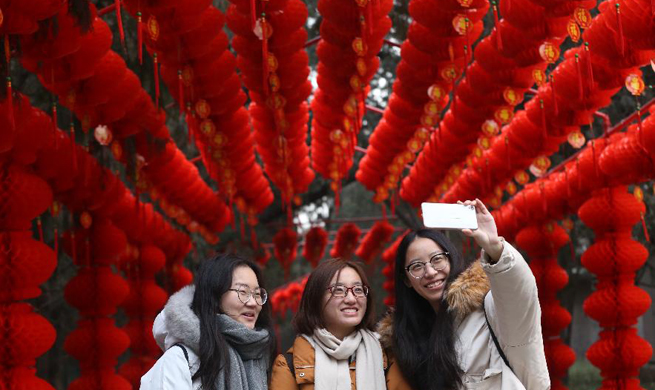by Xinhua writers Yang Shilong, Xu Xingtang, Zhang Mengxi
NEW YORK, Jan. 26 (Xinhua) -- Booming domestic consumption, new technologies and supportive government policies are among a cocktail of "immutable" forces that continue to power China's economic growth, U.S. experts have said.
TRANSITION REMARKABLE
"They get government, they get capital, they get entrepreneurship...in particular, they get consumers. These forces are immutable. They are macroeconomic, they are demographically driven," said Michael Chu, global co-CEO of the private equity firm L Catterton, in his keynote speech at a recent conference themed "Next China: How China will reshape our world" in New York City.
"The issue is really how much it (China's economy) is going to grow. The issue is not it will become an increase in consumer driven economy. That's not the question. The question will just be how much and how fast," said Chu.
Andy Rothman, investment strategist of Matthews Asia, agreed.
The shift from an investment and export-driven economy to a consumption and service model like the one in the United States, "which many thought wouldn't be possible" is happening, said Rothman in a panel discussing China's macroeconomic outlook for 2018.
"I think a lot of people (who) were pessimistic maybe don't understand how much things have changed (in China) in a relatively short period of time," he said.
He said when he first went to China in the 1980s, he could hardly find a privately owned restaurant. Now, he said, almost all the new job creation in China is from small private enterprises.
China's official data showed its gross domestic product reached 82.7 trillion yuan (about 13 trillion U.S. dollars) in 2017, an annual increase of 6.9 percent, as it picked up pace for the first time in seven years. The contribution of consumption to economic growth increased to 58.8 percent from 51.8 percent in 2012.
COCKTAIL OF FORCES
Lots of capital, technologically-enabled transactions, business opportunities, increasing wealth and a supportive government are among the inputs to make the economic transformation in China a success, Chu said.
China implemented a strategy of innovation-driven growth in the past five years, research and development expenditures have increased by an annual more than 11 percent and sci-tech progress has contributed more to economic development.
Mobile and e-commerce markets have provided a great ecosystem for new businesses to grow in China, said Chu. Moreover, the country has more online users than the United States and Europe combined, a staggering 751 million. China saw a daily registration of 16,600 new companies in 2017.
China's investment in artificial intelligence, science, and technology has paid off, Frederick Demopoulos, investor and co-founder of Qunar, said in an interview with Xinhua on the sidelines of the conference.
The BAT giants, i.e. Baidu, Alibaba, and Tencent, have even greater advantages, he said,"they have access to huge amount of data and info which makes them big players in China's AI development as well."
"This is the best time to set up a business in China," he said, citing the massive consumer market and lots of capital and money flowing around besides talents and a big workforce in startups.
China will add 850 million people to its middle income group by 2030, or 73 percent of the population, according to a recent working paper by the Organization for Economic Cooperation and Development (OECD). In contrast, Europe will add only 16 million and North America will see a decline of 16 million.
According to Chu, China's venture capital investment has grown from 12 trillion dollars in 2011-2013 to 77 trillion dollars in 2014-2016.
"In China, every 8 minutes there's a startup being created," Anna Fang, CEO of ZhenFund, told a technology panel. Consumption-focused startups account for about 20 percent funded by the early stage venture capital firms primarily investing in China.
CHALLENGES REMAIN
Stephen Roach, former chairman of Morgan Stanley Asia and senior fellow at Yale University's Jackson Institute for Global Affairs, spoke at the same panel. He noted China's transition toward a consumption-led economy is making progress but still faces challenges.
Roach is the author of the 2014 book "Unbalanced: The Codependency of America and China," published by Yale University Press.
"I'm always wary of the black-and-white, bull or bear (projections), I prefer to be a realist and think about both sets of considerations," Roach said.
On one hand, he said, "China has done a terrific job in the industrial engineering piece of this by boosting the development of the services sector and pushing ahead aggressively on urbanization."
On the other hand, although all of these raised personal income share of the Chinese economy a lot, Roach said, the consumption share of GDP still has great room to grow.
The panelists also discussed China's housing market, local debt, social safety net, and the government's role in regulating those complexities.
Many agree that one has to understand the difference between China's model and the Western model.
"President Xi (Jinping) has obviously made some extraordinary statements of transformations that will be occurring in China over time. And some of those suggest an economy that will be more consumption led," said Merit Janow, a professor of international trade and dean at Columbia University's School of International and Public Affairs, in an interview with Xinhua.
"But these are medium-term challenges for China," Janow said, "and so today's discussion amplified both where the progress is occurring as well as where some of the challenges remain to deal with a country's complexity," she said.
The one-day Next China event was co-hosted by SupChina, a digital media company focusing on China news and commentary, and China Institute, America's oldest educational institution devoted solely to Chinese culture, on Jan. 17 in New York City.
(Xinhua reporters in New York Zhang Yichi, Wang Naishui also contributed to the story)

















